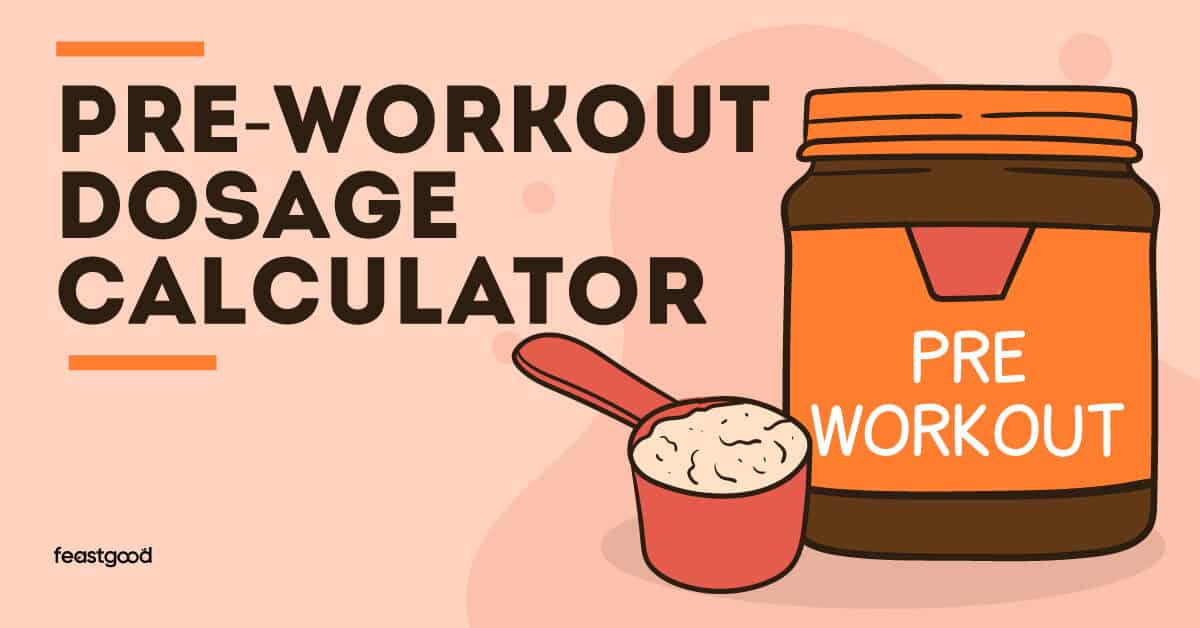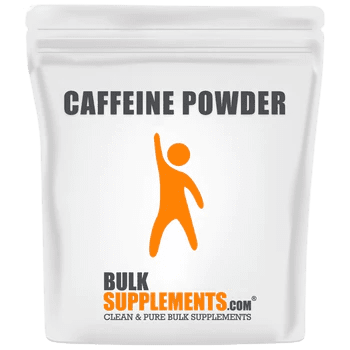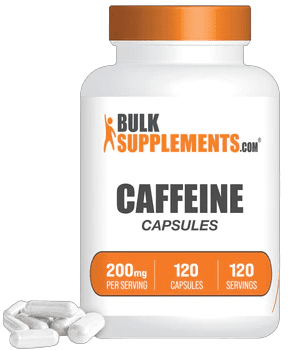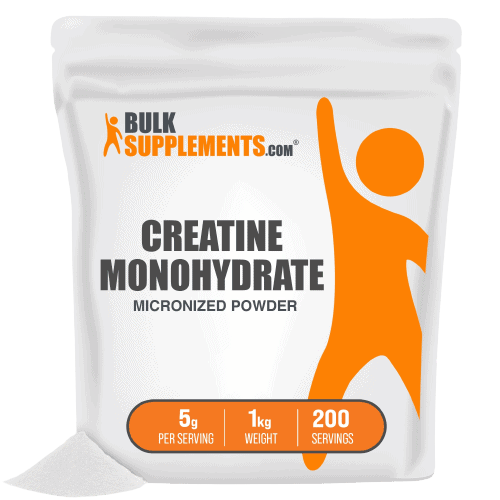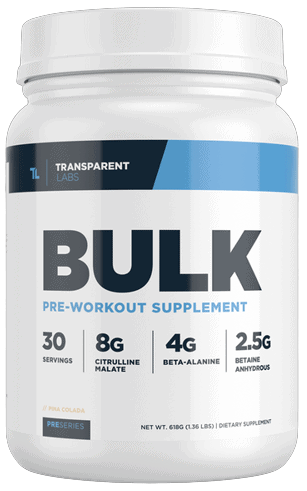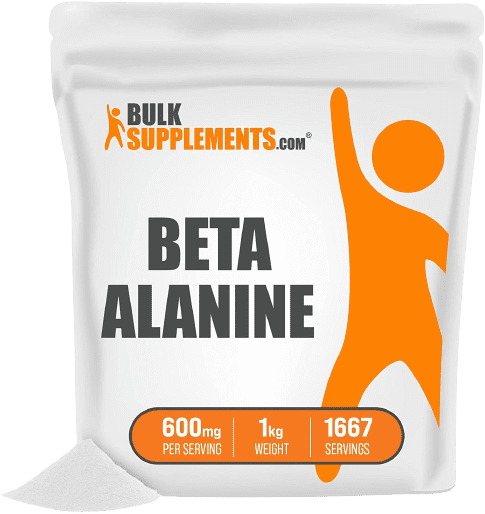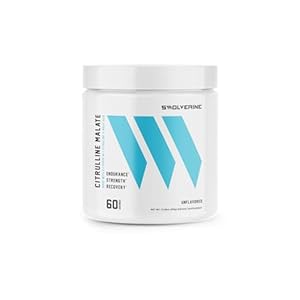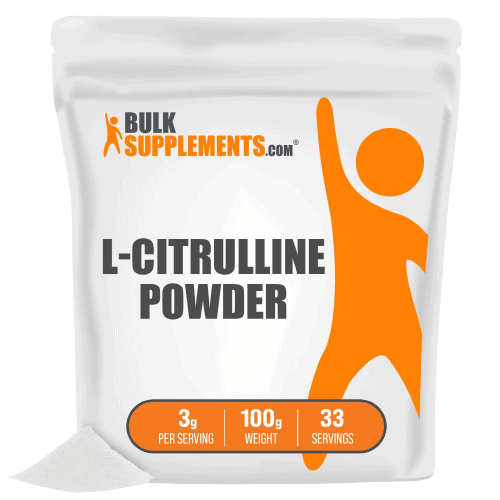This pre-workout dosage calculator is for two groups of people:
(1) Those who want to make their own pre-workout using the most proven ingredients to enhance performance
(2) Those who need a reference for how much of each ingredient should be in a store-bought pre-workout.
This calculator will tell you how much of each key ingredient you should consume in a serving of pre-workout based on your body weight.
- Caffeine: for energy and focus
- Creatine: for strength and power
- Beta-Alanine: for delaying fatigue
- Citrulline Malate: for enhanced blood flow to working muscles
Pre-Workout Ingredients
The following are the ingredients that we recommend looking for when purchasing a pre-workout supplement or making your own.
For a complete list of ingredients that come in pre-workouts, check out Explaining All The Ingredients In Pre-Workout & What They Do.
Caffeine
Caffeine is a naturally-occurring drug found in the leaves and seeds of several plants. It has stimulant effects on the brain and central nervous system, which is what makes it valuable as a performance-enhancing (ergogenic) supplement.
Benefits Of Caffeine For Performance
Caffeine has been shown to reduce perceived exertion, and increase strength, endurance, and power. These benefits are highest during “submaximal” exercise (exercise where your heart rate stays below 85% of your maximum heart rate).
Recommended Dose Of Caffeine
The recommended amount of caffeine depends on your caffeine tolerance – over time, your body can build up a tolerance so that it takes more caffeine to feel its effects.
- Low: if you have a low caffeine tolerance, we recommend 3 mg of caffeine per kg of body weight.
- Moderate: if you have a moderate caffeine tolerance, we recommend 4 mg of caffeine per kg of body weight.
- High: if you have a high caffeine tolerance, we recommend 6 mg of caffeine per kg of body weight, to a maximum of 400 mg per day.
For example, a person who weighs 70 kg would take either 210 mg (low), 280 mg (moderate), or up to 420 mg (high).
Important Note: We do not recommend exceeding the daily safe limit of 400 mg of caffeine.
Where To Buy A Caffeine Supplement
You can buy caffeine in powder form, caffeine pills, or buy it in a pre-workout “stack” (a mixture of supplements like the ones we recommend in our calculator).
I recommend Bulk Supplements caffeine powder if you need to measure out a precise dose, or their caffeine capsules (200 mg each) if your recommended dose is close to either 200 mg or 400 mg – this will save you measuring time.
Creatine
Creatine is an amino acid that is found primarily in muscle tissue and in the brain. Creatine is part of creatine phosphate, which is used in the body’s energy system to make adenosine triphosphate (ATP), the energy “currency” of the body.
Benefits Of Creatine For Performance
Your body actually produces creatine naturally from food that you eat, but supplementing with creatine has gained interest and widespread popularity because it allows for saturation of the muscle stores which provides more fast-acting energy, leading to increased strength, power, and endurance.
Recommended Dose Of Creatine
The recommended amount of creatine depends on whether a short-term (5-7 days) loading phase is used to saturate muscle stores quickly, or a steady daily dose of 3-5 grams, which will achieve saturation levels more gradually (3-4 weeks).
For a loading phase, we recommend 0.3 grams per kg of body weight per day. This is commonly recommended as 20 grams per day (generally), split into 4 servings of 5 grams each. But, the amount will be lower for lighter individuals (less than 120 lbs) and more for individuals who weigh more (greater than 200 lbs).
For example, a person who weighs 70 kg would take 21 grams of creatine per day for 5-7 days for a loading phase (3 doses of 5 grams each and one dose of 6 grams, spread evenly over the day), and then would maintain creatine saturation levels ongoing with a daily dose of 3-5 grams.
For more details, check out our Creatine Dosage Calculator.
Where To Buy A Creatine Supplement
Many pre-formulated pre-workout products do not contain a full serving of 3-5 grams, so I like to buy my own creatine monohydrate on its own and mix it in myself.
Beta-Alanine
Beta-alanine is a nonessential amino acid that is produced in the liver and is also consumed in animal products like beef and chicken. It helps in the production of a molecule called carnosine, which helps to buffer acid in the cells.
When acid builds up it causes us to feel fatigued, so taking a supplement that improves the ability to buffer this acid can delay the time to fatigue when performing high-intensity exercises.
Benefits Of Beta-Alanine For Performance
Supplementing with beta-alanine for at least 2-4 weeks can improve exercise performance, specifically in short (1-4 minutes), high-intensity efforts by allowing you to perform more work before becoming fatigued.
Recommended Dose Of Beta-Alanine
We recommend 16 mg per kilogram of body weight. So, a person weighing 70 kg would take 1,120 mg (1.1 grams).
Supplementation of up to 6 grams daily is considered safe, but higher doses can cause paresthesia, a tingling sensation in the skin, that is usually most noticeable in the face, arms, and hands.
Where To Buy A Beta-Alanine Supplement
Beta-alanine is a very common ingredient in many pre-workout products like Transparent Labs’ Bulk Advanced Pre-Training Formula, but this is another product I like to buy on its own so that I can control the dose for my needs.
Related Article: What Does Pre-Workout Feel Like? 7 Sensations You’ll Get
Citrulline Malate
Citrulline malate is comprised of another nonessential amino acid (l-citrulline) combined with malic acid. L-citrulline is made by the body and can also be ingested in food (watermelon is a great source!).
Benefits Of Citrulline Malate For Performance
Citrulline malate is known as an NO (nitric oxide) enhancer, meaning that it increases blood flow to working muscles, which helps with both performance and recovery by delivering oxygen for energy production and clearing away cellular waste products.
Recommended Dose Of Citrulline Malate
Our recommended dosage is 40 mg per kilogram of body weight, meaning that a person who weighs 70 kg would take 2,800 mg (2.8 grams). Citrulline malate should be ingested thirty minutes prior to exercise.
Where To Buy A Beta-Alanine Supplement
My go-to choice for citrulline malate is Swolverine Citrulline Malate 2:1. For a more budget-friendly option, check out Bulk Supplements’ L-Citrulline DL-Malate 2:1 powder.
Other Pre-Workout Tips
Can You Take More Than The Recommended Pre-Workout Dosages?
No, it is not recommended to take more than the recommended pre-workout dosages. There are no known additional benefits to exceeding the recommended amounts, and there is actually a safety concern if you exceed the daily safe limit for caffeine of 400 mg per day.
How Long Before Exercise Should You Take Pre-Workout?
You should take pre-workout 30-60 minutes before your workout session to give time for the ingredients to be absorbed by your body and to take effect to give you the most benefit for your training.
Should The Amount of Pre-Workout You Take Increase Over Time?
In general, the amount of pre-workout you take should not increase over time, unless you started with less than the recommended dose to see how your body would react to the product. In that case, you can slowly increase up to the recommended dose to reduce the risk developing a high caffeine tolerance and dependence.
Other Nutrition Calculators
Check out our Nutrition Tools page for all of our calculators.
About The Author

Lauren Graham is a Precision Nutrition Level 1 certified nutrition coach. She focuses on helping busy professionals balance healthy eating and purposeful movement. Lauren has a background in competitive swimming and is currently competing as a CrossFit athlete. She has a passion for training, teaching, and writing.
Why Trust Our Content

On Staff at FeastGood.com, we have Registered Dietitians, coaches with PhDs in Human Nutrition, and internationally ranked athletes who contribute to our editorial process. This includes research, writing, editing, fact-checking, and product testing/reviews. At a bare minimum, all authors must be certified nutrition coaches by either the National Academy of Sports Medicine, International Sport Sciences Association, or Precision Nutrition. Learn more about our team here.
Have a Question?
If you have any questions or feedback about what you’ve read, you can reach out to us at [email protected]. We respond to every email within 1 business day.
